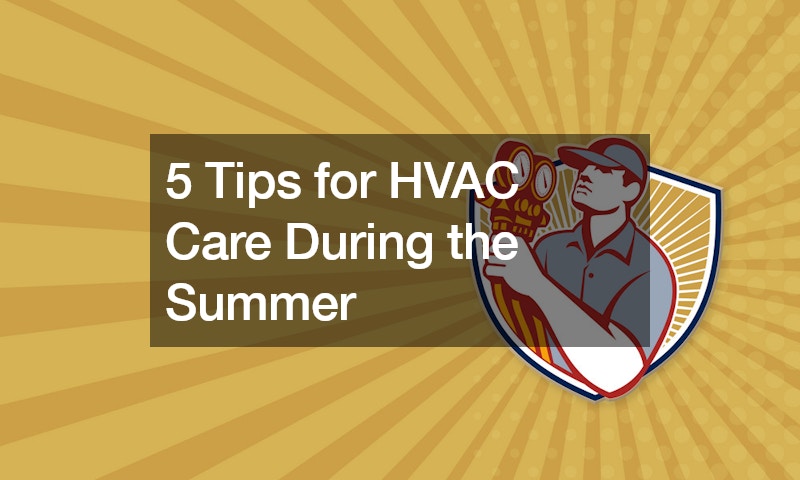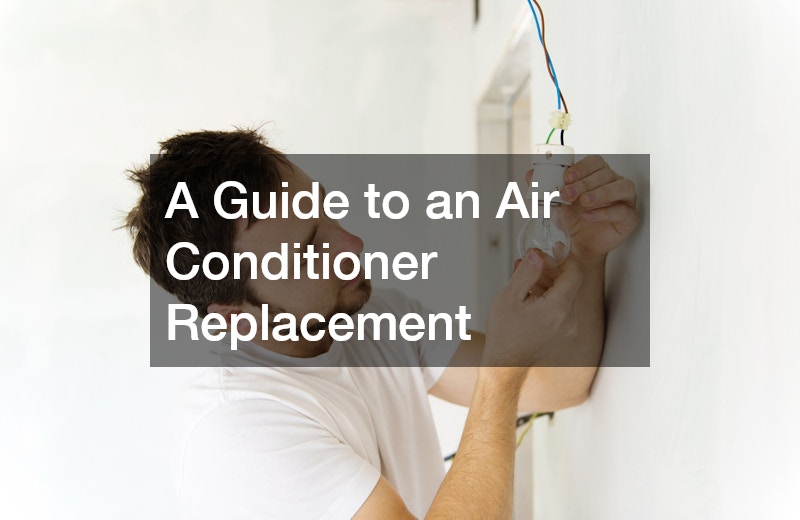Summer will be here before you know it, and it’s essential to have the right cooling system for you, your family, or your business. A simple fan isn’t enough, especially as the planet gets hotter annually. Focus on quality HVAC upkeep this summer so you can have reliable cooling for everyone’s health and comfort. Here are some tips on HVAC care you should be aware of.
1. Clean Your System

When cleaning your home, don’t forget about your HVAC. HVAC care means ensuring your filtration and duct networks are clean and clear from anything harmful to breathe in. Regular air conditioning service professionals check these areas for dirt, dust, debris, mold, or allergens that can make your home life uncomfortable. Did you know that mold can cause several respiratory problems, ranging from asthma to bronchitis to emphysema to lung infections? If you’re constantly breathing this nasty substance daily this summer, it can worsen your health. Over time, you may see increased medical bills. Even if you only have a minor case of asthma, breathing in irritants recirculating from your HVAC unit could lead to more frequent and severe attacks that affect your quality of life.
In other words, HVAC care also means quality lung care. According to Bob Vila, you should have AC inspections at least once a year. You may need to increase the amount of inspections you have when you live in a dusty area, particularly one that has a lot of construction or pollution. After all, that dust can creep into your home and fall on surfaces. That dust can further get into your HVAC at work and circulate when you turn it on. Your AC servicing involves inspecting and cleaning out your AC unit ducts, so they don’t become full of debris and contaminants.
There are some obvious signs that you need additional HVAC cleaning as part of your current HVAC care duties. The easiest way to tell is when you notice visible dust and debris around your vents. If that debris continues to accumulate, you likely have even more accumulation deep down in the vents and duct area. Your debris will be circulating every time you turn the unit on. In some cases, it can become a fire hazard, as too much debris builds up to provide fuel if the HVAC system overheats.
Look out for increased energy bills that don’t make sense. If you have the same amount of HVAC usage and other electrical issues, a functioning AC may be the culprit. When your ducts are clogged, it takes more energy for your HVAC system to work. The harder it works, the more energy it consumes. As you know, energy isn’t free, so the more your home uses, the more those bills will go up.
Pay attention to musty odors coming from your unit. After all, your AC system should be felt, but not smelt. Those musty odors are usually due to mold buildup or dirt. You shouldn’t have to suffer nasty odors to remain cool during a heat wave.
When it’s time to clean out an HVAC system, there are several ways to ensure it’s free of debris. The first part of cleaning the unit involves an inspection. A professional should check the supply and return registers to see how bad the buildup is. Professionals will check for leaks or other duct issues. A leak can cause poor performance and result in water damage to your home. They may also use a vacuum unit to create negative pressure that cleans out one duct at a time. They have other powerful suction equipment to dislodge any settled dust that’s hard to remove. Other components on the filter may need cleaning, such as the drain pan, blower motor, and evaporator coil. On your end, you can always quickly switch out your filter monthly to avoid extreme build-up. However, if you’re more comfortable having a professional handle that aspect of HVAC care, it’s certainly a service worth paying for.
2. Inspect Every Unit

At least one annual inspection of each HVAC unit is required to ensure they’re functioning as needed. Failure to get timely inspections can affect your insurance. In other words, if your HVAC system breaks down because you didn’t schedule those inspections or regular service, then you may void your insurance policy. As a result, if you need AC replacement services, expect to pay for it out of your pocket. Prevent this huge financial blow and have professionals do regular inspections as part of your HVAC care before, during, and after the summer.
Your summer HVAC care should include frequent filter changes. Like most people, you may use your HVAC system more this summer than any other time of the year. Therefore, summer is likely to make your filter get clogged faster, especially if there’s dust in the air. The filter is simple to replace if needed.
AC services should include monitoring your thermostat. You want to ensure you have accurate temperature control. If the display temperature doesn’t seem like it matches what you feel, it may be off. It may need battery replacement or additional servicing. You should also check for visible signs of damage around the unit. Inspect the drain pan for clogs and signs of leakage. Speaking of leaks, you should thoroughly inspect the area near any HVAC unit. Some systems contain a coolant to keep things flowing. If your AC begins to malfunction, some of the coolant may leak out. That’s usually a sign your HVAC system even needs replacement. If this leak continues, it won’t stop on its own and may cause damage to your drywall and floors, and may even breed mold on those services. According to CNET, it only takes mold 24 to 72 hours to sprout on any wet surface, whether wet from water or AC coolant.
3. Install a New Air Conditioner

After all the inspections and repairs, you may realize it’s time for a new AC install this summer. Like any other feature in your home, your AC has an expected lifespan. According to today’s homeowner, a typical AC unit can last about 15 to 20 years. As it gets closer to the end of its projected lifespan, replace it before it completely goes out. If this summer marks the end of such a lifespan, you may want to replace it ahead of time, so you avoid being caught without an AC for a few days or weeks. After all, if you’re in the middle of a heat wave, it won’t take long to succumb to heat-related illnesses. If you have vulnerable family members in your home, such as children, the elderly, or pets, you should be extra cautious about having a unit that may fail at the wrong time.
If you had frequent repairs, especially in the last few years, it’s a sign that it’s time for a new one. After all, it may be more cost-effective to replace your unit or entire system if you keep spending money on repairs. You should assess the repair cost spent over the past few years. If you realize that it’s equal or almost equal to the cost of a replacement unit, that’s a sign you need to get a new one. Pay attention to the amount of efficiency your HVAC system has. After all, who wants to stand under the unit to feel cold air? It should properly circulate throughout your home so you feel it in every room. This poor efficiency can be due to age damage, failed compressors, clogged ducts and filters, and more.
Your local air conditioning company may have access to better quality energy-efficient units. After all, the United States government has created several initiatives for American homeowners to install more energy-efficient features in their homes. If you make such an update, you may be able to get a tax rebate at the state and or federal level. The Energy Star brand is one of the standard energy-efficient companies that provide such HVAC units and other appliances. An Energy Star brand installation this summer may help you see a 15% reduction in your regular electricity bills.
4. Consider Heating Upgrades

Your summer HVAC care may include getting heating and cooling upgrades. If you had the same unit or system for the past decade or longer, it may be time to get a more modern one. Make adjustments to your home that can help ensure the efficiency and lifespan of your existing unit. For example, better insulation upgrades can keep heated or cooled air inside. If you haven’t replaced your windows, it may be time to let go of those single-pane ones for double or triple-pane ones. Install awnings outside over your windows and doors, as they also help to keep your home cooler throughout the year. Check if local arborists or landscapers can plant trees in strategic places. These planted trees can insulate your home throughout the year, so your heating and cooling systems can work less.
Give your HVAC system a break by having a separate heating system. Therefore, if you haven’t done so already, summer is a perfect time to invest in a boiler install. Doing so now can save you from the winter rush. You may also get a better rate if you do it during the summer. Start to consider the right type of heating oil. Many Americans continue to rely on propane to heat their homes. One of the reasons for such popularity is the efficiency, high temperature, and availability of propane. Over 90% of propane used in the United States is produced in North America. You should also know that modern heating oil systems may be able to manage as many as 15 different zones with only one burner, according to Powers-Oil. Thanks to the efficiency rate of a burner, you’ll feel more heat throughout the winter and be able to save on bills. Plus, you’ll provide HVAC care by giving it a rest so it’s not overworked, especially if you use it frequently in the summer months.
5. Research New Trends
The advances in technology are also being seen in the HVAC world. Some eco-friendly innovations include the use of solar-powered HVAC systems. The rise of solar energy has continued to increase among American homeowners and businesses interested in reducing the carbon impact, having clean and reliable energy, and reducing or even eliminating electricity bills. Solar-powered AC installations rely on the sun to give you the cold air you need. You can also get a system that has a more environmentally friendly refrigerant with lower global warming potential, also known as GWP refrigerant.
Depending on the size of your home, you may want to consider installing a multi-zone system. A multi-zone system is something you see in an area like a hotel or a school. For example, your hotel room allows you to control your own AC unit just as every room on that floor can. You don’t have to rely on an overall AC unit that powers the floor. You can install this type of network in your home, which provides better comfort and minimizes energy waste. That way, if you have many people in your home with different temperature tolerance, everyone can be comfortable in their own space.
Your summer HVAC care should also consider HVAC as a service, or HVACaaS trend. This service allows you to pay a monthly fee for access to AC repair companies that also handle maintenance and installation. Therefore, you don’t have to fumble around for an AC repair guy for emergency service. Enjoy constant care for a monthly fee, just as you would with your cell phone or other delivery services.
As you can see, you have many ways to ensure proper HVAC care in your home. Being mindful of protecting, inspecting, and repairing your unit can help you save money, provide comfort, avoid heat-related illnesses, and have a functioning unit that can last years. Having a cool summer is made easy by following these tips.



